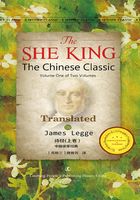
KEANG YEW SZE
1 The Këang has its branches, led from it and returning to it.
Our lady, when she was married,
Would not employ us.
She would not employ us;
But afterwards she repented.

Only the wife could pass the whole night with her husband. The other members of the harem were admitted only for a short time, and must go and return in the dark. But so had the influence of king ăn and T'ae-sze wrought, that throughout Shaou and the south the wives of the princes allowed their ladies freely to share the favours of their common lord, only subject to the distinctive conditions belonging to her position and theirs. Hence as they were not jealous, the others were not envious. Such is the interpretation given to this piece; but there are difficulties, it will be seen,with some of the lines.
L.1. 嘒=小貌, 'small-like'. L.2. 三五 are best translated literally, meaning a few. So, Choo. Maou makes them out to be certain stars in Scorpio and Hydra; but it seems decisive against him that those stars are not visible together in the morning, in the same month. There can be no doubt, however, as to the identification of參 and 昴 in st. 2; but we must not seek, in the 1st line, a special allusion to the mass of the concubines, and in the 2d to those of higher rank among them. L.3. Maou explains 肅肅 as 'the app. of rapidity', to which Choo would add that of 'reverence'.征=往, 'to go'. 宵=夜, 'at night'. The difficulty to me is with the 4th line. If 宵 denote the time of the concubines' going, and 夙夜 the time of their return,then they have been the night with the prince. It seems to me that 宵 and 夙夜 must have nearly the same meaning, and that 宵 should be translated—'in the dark'. 在公 is inconsistent with the 4th line's speaking of the return of the ladies. K'ang-shing's view, that夙夜=或早或夜, 'some early, some late, and that this and the next line set forth the different times at which different ladies were received, ought not to be entertained. It is a strange picture which the 4th line of st. 2 gives us, of the concubines carrying their sheets with them to the prince's chamber. L 5. This line expresses the acquiescence of the concubines with their lot. 實 or 寔 may be taken as=是, 'to be', 'it is'. The use of 猶 as an adjective is to be noted.
The rhymes are—in st. 1, 星, 征, cat. 11; 東, 公, 同, cat. 9: in 2, 星, 征; 昴*, 稠, 猶, cat. 3, t. 2.
Ode 11. Allusive. JEALOUSY CURED. THE RESTORATION OF GOOD FEELING IN A HAREM.

2 The Këang has its islets.
Our lady, when she was married,
Would not let us be with her.
She would not let us be with her;
But afterwards she repressed [such feelings].
3 The Këang has the T'o.
Our lady, when she was married,
Would not come near us.
She would not come near us;
But she blew that feeling away, and sang.


Acc. to the little Preface, with which Choo in the main agrees, the bride of some prince in the south had refused to allow her cousins, who by rule should have accompanied her, to go with her to the harem;but afterwards, coming under the influence of the govt. of king Wăn and the character of T'ae-sze, she repented of her jealousy, sent for them, and was happy with them. Such is the traditional interpretation of the piece, and the lines suit it tolerably well.
L.1, in all the stanzas. 汜 is the name for streams derived from larger rivers, flowing through a tract of country, and then conveyed into their mother stream again. From the definition of the term in the Urh-ya,水決復入為汜, it would appear that such streams were made in the 1st place artificially. 渚 is 'a small islet'.Rising in the stream, it divides its waters which again unite at the other end of it. 沱 was the name of rivers issuing from the Këang, pursuing a different course from the main stream, but ultimately rejoining it. Two T'os are mentioned in the Shoo (III. i. Pt. i. 64; Pt.ii. 9): These lines contain the allusive portion of the ode, giving, all of them, the ideas of separation and reunion.
L. 2. The 之子 is, of course, the wife that is spoken of, and in the connection 之子歸=此子向者于歸之時,'this lady, formerly, when she went to her home'.
L1. 3, 4. These lines all describe the early conduct of the wife, though it is perhaps too much to infer, with the critics, from the words, that she left her cousins in their native State. There is nothing in the terms which would not be satisfied with their having in the first place accompanied her to the harem, and then been kept by her in the background. 以 is to be taken in the sense of 用, 'to employ'. 與 is not distinguished by Choo from 以. We may explain it by 'to be with','to associate with'. We hardly know what to make of過. Choo says, 過謂過我而與俱也, 'to pass close to us, and then to be together with us'. L.5. describes the wife's subsequent conduct. I cannot follow Choo in his account of 處,—安也, 得其所安也. Maou explains it by 止, 'to stop', 'to desist'; which K'ang-shing enlarged to 自止, 'she repressed herself'. 嘯 is 'to purse up the mouth and emit a sound',= 'to blow', 'to whistle'. Morrison quotes the line under the character, saying, 'K'e seaou yay ko, "whistled and sang", to divert the mind from what vexed it'; but the whistling and singing was an expression rather of relief and satisfaction.
The rhymes are—in st. 1, 汜, 以, 以, 悔*, cat. 1, t. 2: in 2, 渚, 與, 與, 處, cat. 5, t. 2: in 3, 沱, 過, 過, 歌, cat.17.

